Mayoral Hopefuls Divided on Sex Work Decrim at Jim Owles Forum | Gay City News
Repeal This Law: New York must remove from the books a statute that criminalizes Walking While Trans | Daily News
The Second Anniversary of Sex Worker Pride
September 14, 2020
Sex workers and allies celebrated the second anniversary of Sex Worker Pride. The holiday was launched last year by the Global Network of Sex Work Projects (NSWP) to celebrate the achievements of our movement and allow sex workers the chance to share stories of self-determination and survival.
This event extends to all groups who are marginalized by criminalization, discrimination, and stigma. The sex worker rights movement celebrates the diversity within our community as a sign of its strength. In particular, the intersection between LGBTQIA pride and sex worker rights is recognized. Umbrella Lane, a Glasgow-based direct service and advocacy organization in the U.K., released a video to celebrate their pride event.
In 2019, organizations around the world hosted parades and celebrations. This year, social distancing limited the events that could be held, but the meaning is no less poignant. The COVID-19 pandemic has had a severe impact on sex workers’ ability to survive. Many have pivoted to online work where possible, bolstered by mutual aid funds started by community organizations like SWOP Brooklyn, Red Canary Song, Trans and Gender Diverse Community Financial Assistance Programs in King County, WA, SWOP Behind Bars, and many more.
As we honor the rights and dignity of all workers and all identities, please consider donating to an organization that supports these values, whether that be DSW or another organization.

Ashodaya Mandya, an organization founded in India last year, hosted a Sex Worker Pride march in 2019. (Photo: NSWP)

(Photo: @jess_the_fairy/Instagram)
DSW Newsletter #18 (September 2020)
Hero(es) of the Month: Honoring the Dancers of the Lusty Lady
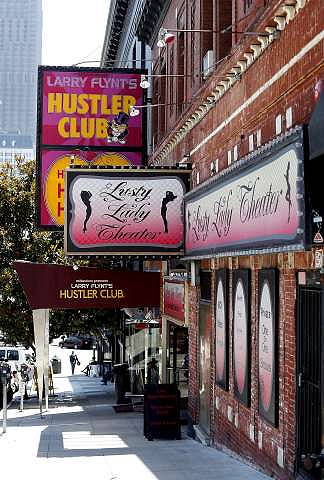
The Second Anniversary of Sex Worker Pride

De Blasio To Change NYC Sex Work Policy
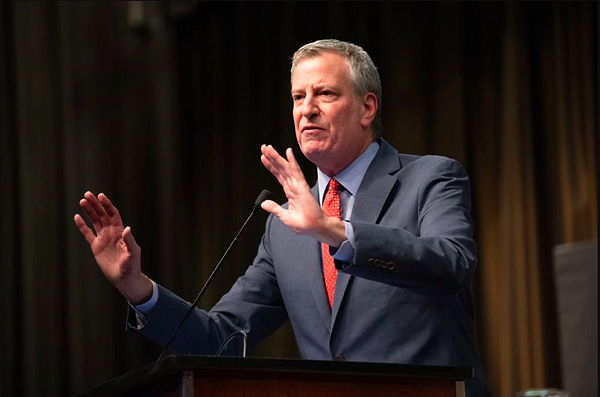
OnlyFans’ New Policy Endangers Sex Workers During COVID-19

DSW’s Melissa Broudo Featured in Film Series on Inspirational Women
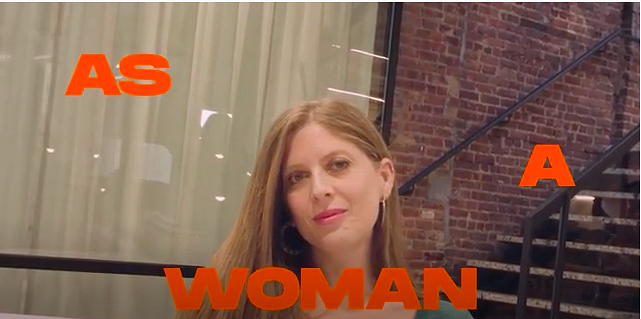
 Hero(es) of the Month: Honoring the...
Hero(es) of the Month: Honoring the...
 The Second Anniversary of Sex Worker...
The Second Anniversary of Sex Worker...
 De Blasio To Change NYC Sex...
De Blasio To Change NYC Sex...
 OnlyFans’ New Policy Endangers Sex Workers...
OnlyFans’ New Policy Endangers Sex Workers...
 DSW’s Melissa Broudo Featured in Film...
DSW’s Melissa Broudo Featured in Film...
DSW Newsletter Archive
De Blasio To Change NYC Sex Work Policy
September 2, 2020
NYC Mayor Bill de Blasio has changed his stance on sex work, moving away from full criminalization and toward support of the Entrapment Model, according to a statement he made in response to questions about the arrest and prosecution of Layleen Polanco. De Blasio announced he does not believe that sex workers should ever be arrested but that “the people who are organizing and profiting from that sex work should be.”
The Entrapment Model — often referred to as “End Demand” or the “Nordic Model” — is a form of policing in which the sale of commercial sex is not criminalized, but purchasing sex still is. While many claim that the Entrapment Model supports sex workers, where and when it has been implemented, violence against sex workers remains.
Polanco was a 27-year-old transgender woman sent to Rikers Island on prostitution and drug possession charges last year. She died from seizure complications while in solitary confinement. Polanco’s death brought attention to much of the violence and abuse faced by sex workers, particularly transgender sex workers of color, in NY State and across the country.
The mayor’s statement is a step in the right direction. Still, he fails to differentiate between criminals who exploit and abuse sex workers, and nonviolent clients and non-abusive third parties whom sex workers often work with or hire for protection. De Blasio ignores the reality that people often engage in sex work by choice.
Last year, the mayor came out staunchly against the decriminalization of sex work. Around the same time, Manhattan DA Cy Vance Jr. and Brooklyn DA Eric Gonzalez committed to reducing the amount of prostitution-related charges prosecuted, even as “policing of sex work continues.” NY sex worker advocates disagree with the district attorneys’ claims that they support partial decriminalization by offering community-based services to sex worker defendants. Charges are dismissed only if services mandated by the prosecution are completed.
“It is long past time that we dispel the myth that people arrested on prostitution charges, nearly all of whom are Black, Latinx, and Asian transgender and cisgender women are “rescued” by police officers and benefit from being arrested and prosecuted or placed into court-ordered diversion programs,” said Jillian Modzeleski in a statement on behalf of Brooklyn Defender Services around the mayor’s comments. “At the same time we must dispel other myths that NYPD focuses on traffickers, which is belied by arrest data, and that criminalization keeps people safe.” Modzeleski confirmed that the mayor appears to support the Nordic Model, which contributes to the stigmatization and criminalization of many parts of sex work, putting workers themselves at risk.
“I give the DA offices a lot of credit in trying to reduce the harm for prosecuting these offenses, but prosecuting these offenses is still prosecuting them. It is tying programs and services and a better disposition to a court process. That is not decriminalization,” Kate Mogulescu, an assistant professor of clinical law at Brooklyn Law School and a fellow member of the New York Anti-Trafficking Network with DSW, told the NY Daily News.
De Blasio concluded his statement saying that the changes to the way NYC polices sex work “need to deepen.” DSW hopes that the mayor will follow through on his promise to stop the arrests of those who do sex work in earnest and commit to significant change.
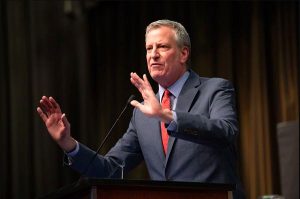
Last year, NYC Mayor Bill de Blasio said he was “not comfortable with” the idea of decriminalizing sex work, although city prosecutors claimed it was already happening. (Photo: Barry Williams/NY Daily News)
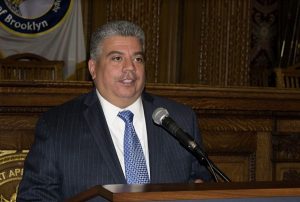
Brooklyn District Attorney Eric Gonzalez says he “believes in decriminalization,” though his office’s actions do not fully reflect that position. (Photo: Brooklyn Eagle)

Layleen Polanco (left) pictured with her sister, Melania Brown, shortly before Polanco’s arrest in 2019. (Photo: Courtesy of Melania Brown/NBC News)
DSW Newsletter #18 (September 2020)
Hero(es) of the Month: Honoring the Dancers of the Lusty Lady

The Second Anniversary of Sex Worker Pride

De Blasio To Change NYC Sex Work Policy

OnlyFans’ New Policy Endangers Sex Workers During COVID-19

DSW’s Melissa Broudo Featured in Film Series on Inspirational Women

 Hero(es) of the Month: Honoring the...
Hero(es) of the Month: Honoring the...
 The Second Anniversary of Sex Worker...
The Second Anniversary of Sex Worker...
 De Blasio To Change NYC Sex...
De Blasio To Change NYC Sex...
 OnlyFans’ New Policy Endangers Sex Workers...
OnlyFans’ New Policy Endangers Sex Workers...
 DSW’s Melissa Broudo Featured in Film...
DSW’s Melissa Broudo Featured in Film...
DSW Newsletter Archive
Hero(es) of the Month: Honoring the Dancers of the Lusty Lady
September 1, 2020
In 1996, the Lusty Lady in San Francisco became the first strip club in the country to successfully unionize, making history for the entire informal labor sector, including sex work. Despite the club’s closure in 2013, “Lusties,” as the dancers call themselves, remain a symbol of resilience and empowerment in an industry so often criticized for exploitation.
Siobhan Brooks, a dancer in the Lusty Lady peep show who went on to earn her Ph.D. in Sociology, played a pivotal role in unionization. Brooks observed that the club hired very few women of color and rarely allowed Black women to work in the private booth section, where dancers made larger tips. She raised her concerns with management and was told that "[B]lack women make the club lose money." In response, Brooks filed a racial discrimination complaint with the Equal Employment Opportunity Commission. Employees voted in favor of unionizing, and the club was organized by the Exotic Dancers Union, an affiliate of Service Employees International Union (SEIU). The next year the Lusty Lady hired more Black women than it ever had before. Brooks later authored “Organizing From Behind the Glass,” an account of the successful unionizing effort, for the January 1997 issue of Z Magazine.
In 2001 Roger Forbes, a strip-club magnate and partner in Déjà Vu, a company that owns most of the adult theaters and clubs in San Francisco, bought the building and doubled the rent. The owners were facing incredible pressure to close. In response, dancers at the Lusty Lady pooled together $400,000 and purchased the club. For the next 10 years, the Lusty Lady functioned as a worker-run cooperative known for defying stereotypes of tanned, blonde strippers favored by traditional club management.
The Lusties are the inspiration for a growing number of “Stripper Strikes” across the country. In Minneapolis, New York City, Portland, and beyond, dancers began organizing to oppose racist hiring practices, wage theft by management, and a lack of labor and safety protection in clubs. We Are Dancers USA, a national harm-reduction and advocacy organization, was founded in 2018 to empower strippers across the country in response to a gap in resources tailored explicitly to dancers. The organization grew out of We Are Dancers NYC, a local organization founded by dancers and allies, including DSW’s Melissa Broudo.
The NYC Stripper Strike partnered with Broudo and DSW colleague Crystal DeBoise to raise awareness around discrimination and exploitation in city clubs, gaining support from the International Women’s Strike. In response to a report by the Minneapolis Health Department that raised concerns about many city clubs, SWOP Minneapolis partnered with Minnesota State University to successfully pass a city ordinance protecting strippers’ rights in 2019. In Portland, the Haymarket Pole Collective’s grassroots activism has spurred the city’s clubs to adopt mandatory anti-racism training, enforce fair labor practices, and maintain racial equity in hiring practices.
DSW is proud to be a part of the Lusty Lady’s legacy, building equity and empowerment for all workers.
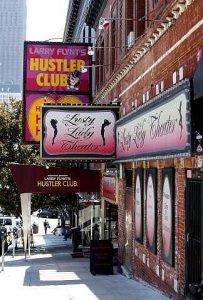
The facade of the Lusty Lady in San Francisco shortly before the club closed in 2013. (Photo: Sarah Rice, Special to The Chronicle, 2013)
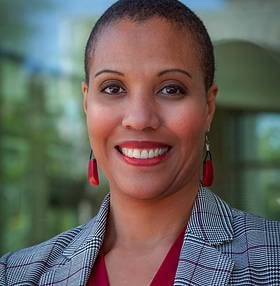
Siobhan Brooks, a former dancer at the Lusty Lady, is now an associate professor of African American studies at California State University, Fullerton, and continues to advocate for sex worker rights. (Photo: NY Times, 2019)
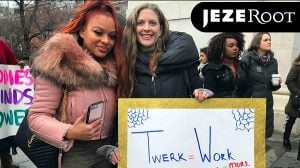
Gizelle Marie (left), founder of the NYC Strippers Strike, marches for stripper labor rights with DSW’s Melissa Broudo. (Photo: SOAR Institute, 2018)
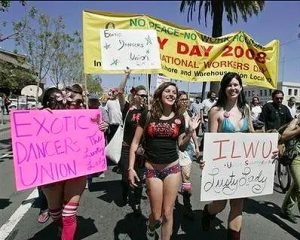
Performers from the Lusty Lady represent the Exotic Dancers Union at the 2008 May Day March in San Francisco. (Photo: LA Times, 2008)
DSW Newsletter #18 (September 2020)
Hero(es) of the Month: Honoring the Dancers of the Lusty Lady

The Second Anniversary of Sex Worker Pride

De Blasio To Change NYC Sex Work Policy

OnlyFans’ New Policy Endangers Sex Workers During COVID-19

DSW’s Melissa Broudo Featured in Film Series on Inspirational Women

 Hero(es) of the Month: Honoring the...
Hero(es) of the Month: Honoring the...
 The Second Anniversary of Sex Worker...
The Second Anniversary of Sex Worker...
 De Blasio To Change NYC Sex...
De Blasio To Change NYC Sex...
 OnlyFans’ New Policy Endangers Sex Workers...
OnlyFans’ New Policy Endangers Sex Workers...
 DSW’s Melissa Broudo Featured in Film...
DSW’s Melissa Broudo Featured in Film...
DSW Newsletter Archive
The EARN IT Act: How an anti-child exploitation law could cause more problems than it solves | fouroneone.consumersadvocate.org
OnlyFans’ New Policy Endangers Sex Workers During COVID-19
August 27, 2020
OnlyFans, a subscription service that online sex workers use to post content, recently instituted sweeping policy changes that will cost creators thousands of dollars each month, at a time when they can least afford it. The website recently changed payouts from weekly to monthly and capped pay-per-view prices at $50 and tipping at $100, both of which used to be without a maximum. In-person sex workers who lost their primary source of income due to the pandemic have been left out of government aid plans. Many have pivoted to online platforms to survive. These regulations are catastrophic.
Many content creators suspect that these changes are a result of the actions of Bella Thorne, an actress and celebrity who joined the website in August and defrauded customers on OnlyFans. Thorne’s public image has been vocally pro-sex-work. She directed an adult film entitled “Her & Him” last year for which she received a Pornhub award. Thorne reportedly made $1 million in her first day on OnlyFans and $2 million by the end of the week. The actress, worth between $5-12 million, justified her presence on the site as research for a movie she claimed to be collaborating on with director Sean Baker. Baker later denied these claims. In an interview with LA Times reporter Amy Kaufman, Thorne said she wanted to dedicate her OnlyFans earnings to starting a production company and would be donating the rest to charity.
The actress also advertised a nude pay-per-view image for $200 a view to her 50,000 followers. The photos were not nudes but pictures of Thorne in lingerie, sparking a record number of refund requests issued to OnlyFans. The platform stated that the payout changes were not due to any individual user’s actions, and “transaction limits are set to help prevent overspending and allow our users to continue to use the site safely.” Still, creators link Thorne’s involvement and the subsequent changes.
Thorne issued an apology on Twitter for joining OnlyFans. She said that she had been trying to “remove the stigma behind sex, sex work, and the negativity that surrounds the word SEX itself by bringing a mainstream face to it,” and “help bring more faces to the site to create more revenue for content creators on the site.” She apologized for the harm she caused in the process and said she was meeting with OnlyFans to understand the changes.
Interviews with sex workers who use OnlyFans reveal that adult content creators stand to lose a large percentage of their income. Canadian-based sex worker Rebecca Madison told VICE that she’s worried creators will be forced to sell “content at prices lower than what they are comfortable with due to these new financial pressures,” depressing the market long-term.
While this might have been “research” or a statement for Thorne, OnlyFans is how many creators pay their rent and buy food. The presence of celebrities like Thorne increases competition on the website and threatens that income. TS Jane, a trans sex worker from California and president of the Sex Workers Outreach Project, says that price caps will force some into street-based work where their lives are endangered. On OnlyFans, “I’m empowered with what I do; I can set my own prices, create what I want; I’m my own boss,” Jane told VICE. But that empowerment is jeopardized if sex workers are forced to sell their content for less than it’s worth.
OnlyFans has done a lot for sex workers, but if we do not listen to those most impacted and prioritize their needs, it may fail the community it aims to support.

Actress Bella Thorne is rumored to have instigated the policy changes by her conduct on the site. (Photo: Jeff Spicer/BFC/Getty Images)
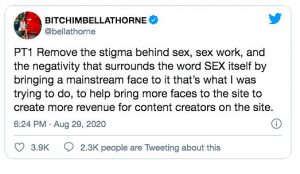
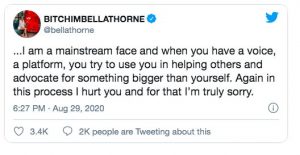
Thorne issued an apology to sex workers and OnlyFans users for her actions via Twitter. (Photo: @bellathorne/Twitter)
DSW Newsletter #18 (September 2020)
Hero(es) of the Month: Honoring the Dancers of the Lusty Lady

The Second Anniversary of Sex Worker Pride

De Blasio To Change NYC Sex Work Policy

OnlyFans’ New Policy Endangers Sex Workers During COVID-19

DSW’s Melissa Broudo Featured in Film Series on Inspirational Women

 Hero(es) of the Month: Honoring the...
Hero(es) of the Month: Honoring the...
 The Second Anniversary of Sex Worker...
The Second Anniversary of Sex Worker...
 De Blasio To Change NYC Sex...
De Blasio To Change NYC Sex...
 OnlyFans’ New Policy Endangers Sex Workers...
OnlyFans’ New Policy Endangers Sex Workers...
 DSW’s Melissa Broudo Featured in Film...
DSW’s Melissa Broudo Featured in Film...
DSW Newsletter Archive
NY Senate Fails Trafficking Survivors, Again
July 21, 2020
Through our work with the New York Anti-Trafficking Network (NYATN) and the START Coalition (named for this bill), DSW has been tirelessly advocating for the Survivors of Trafficking Attaining Relief Together (START) Act, a bill allowing survivors of trafficking to clear their criminal records of arrests stemming from exploitation. NY-AB 6983 (Gottfried) passed the Assembly 104–38. Despite urging from advocates and activists, Majority Leader Andrea Stewart-Cousins failed to bring the Senate version of the bill, sponsored by Sen. Jessica Ramos (D-Queens), to a vote.
The 2019 version of this bill, also sponsored by Assemblymember Richard Gottfried (D-Manhattan), passed the Assembly last June. Despite support from immigrant rights groups, public defender organizations, numerous district attorneys, and the NYC Bar Association, the Senate never brought the bill to the floor.
Criminal convictions create enormous barriers in the lives of trafficking survivors. For many, criminal records preclude them from most employment opportunities, public health benefits, and other resources. They also increase the risk of deportation for immigrant survivors, all because they were trafficked. That the Senate continues to stall on this urgent issue, despite having the votes, is a glaring failure of leadership.
In 2010, New York became the first state in the U.S. to allow victims to clear their records of prostitution-related convictions. While working as a staff attorney at the Sex Workers Project in NYC, DSW’s Melissa Broudo won the first motion in the nation to offer relief to survivors of trafficking with criminal convictions. Attorneys for survivors say that, although district attorneys are willing to clear sex-work-related offenses in most cases, the process is long and arduous. But these protections are inadequate to support survivors fully. Traffickers force their victims to perform various crimes in addition to sex work, such as theft, drug use, and trespassing. These charges pose the same collateral consequences but are ineligible for vacatur, a legal term referring to an order that sets aside a judgment or annuls a proceeding.
Mateo Guerrero-Tabares, lead organizer for transgender, gender non-conforming, intersex, and queer (TGNCIQ) justice with Make the Road New York, an immigrants rights group in NYC, told the Queens Daily Eagle that “not removing charges given to survivors of human trafficking — as a result of the coercive environment — specifically for undocumented folks means that they will face a lot more challenges in trying to adjust their immigration status, and therefore drive them more into the shadows and expose them to more danger.”
Advocates will keep fighting. Many, like Broudo and Crystal DeBoise of DSW, have spent their careers supporting survivors in forging a better life, which includes removing prior convictions. “There is a real need to expand vacatur so that the law can allow more survivors to move forward without a burdensome and unjust criminal record, which presents myriad barriers to employment, housing, immigration, and other critical areas. We owe it to survivors to not be continually revictimized and retraumatized by the criminal justice system,” says Broudo.
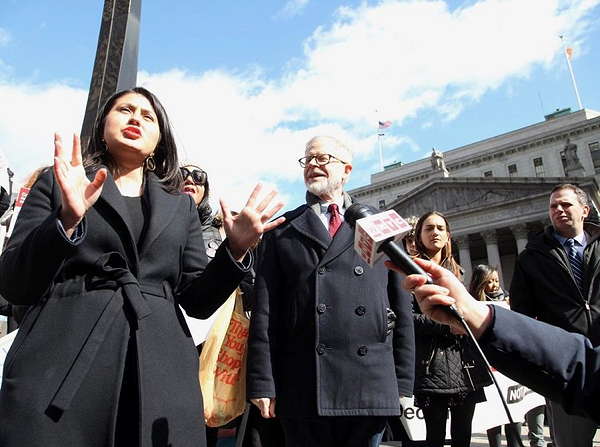
NY state Sen. Jessica Ramos and Assemblymember Richard Gottfried speak in June of 2019 on the bill they sponsored, which enables survivors of human trafficking to get their criminal records cleared. (Photo: Danielle Blunt/Queens Daily Eagle)
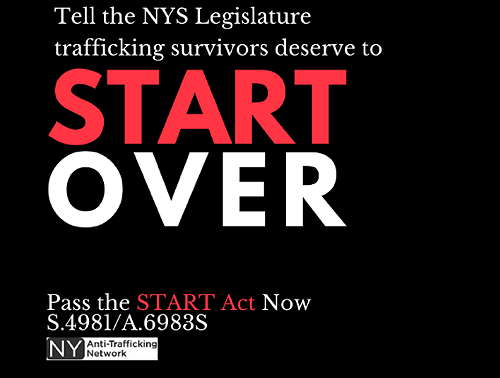
In NY state, trafficking victims may face deportation for offenses they were forced to commit. (Photo: NYATN/Twitter)
DSW Newsletter #17 (August 2020)
Hero(es) of the Month: TS Candii, SX Noir, and Gizelle Marie Organize the Largest Sex Worker March in U.S. History
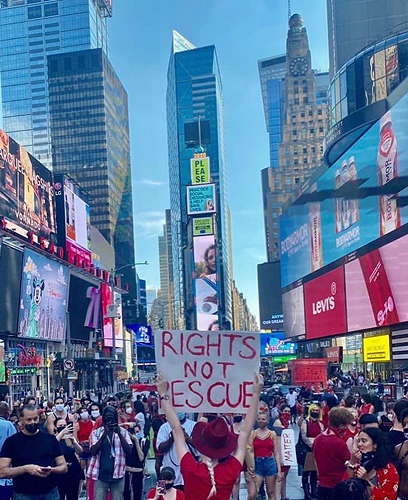
MA Democratic Senate Candidates Are Listening to Sex Workers

NY Senate Fails Trafficking Survivors, Again

DSW’s Kaytlin Bailey on Sex Work and Police Reform
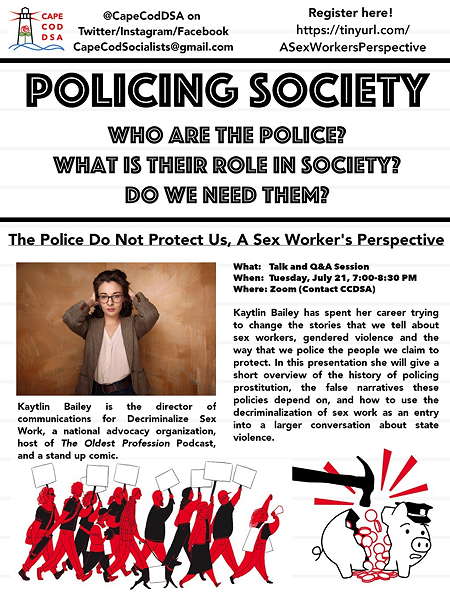
DSW Takes Action Against EARN IT

The Stripper Strike Goes National
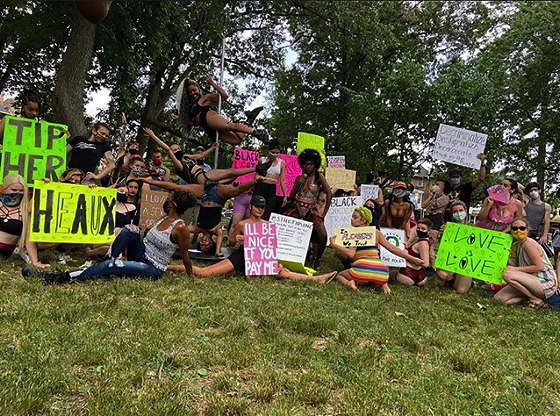
 Hero(es) of the Month: TS Candii,...
Hero(es) of the Month: TS Candii,...
 MA Democratic Senate Candidates Are Listening...
MA Democratic Senate Candidates Are Listening...
 NY Senate Fails Trafficking Survivors, Again
NY Senate Fails Trafficking Survivors, Again
 DSW’s Kaytlin Bailey on Sex Work...
DSW’s Kaytlin Bailey on Sex Work...
 DSW Takes Action Against EARN IT
DSW Takes Action Against EARN IT
 The Stripper Strike Goes National
The Stripper Strike Goes National
DSW Newsletter Archive
MA Democratic Senate Candidates Are Listening to Sex Workers
August 4, 2020
U.S. Sen. Edward Markey and U.S. Rep. Joseph Kennedy III, rivals in the MA Democratic Senate primary, both voiced their support for the full decriminalization of sex work on a criminal justice panel. In this hotly contested race, the candidates have been recognized as having relatively similar policies. Kennedy voiced his belief that “the time has come to decriminalize and legalize sex work.” He also expressed a desire to work with advocates to “ensure the result isn’t a system that makes it easier for sex workers to be exploited.” Markey was quoted as saying, “It’s our responsibility to listen to sex workers and advocates to work together on how to move forward,” in a less explicit, but still encouraging commitment to decriminalization.
Along with fellow advocates and allies, DSW has been working tirelessly to push full decriminalization into national policy discussions. Last year, our organization launched a campaign to educate presidential primary candidates on decriminalization and why it is essential to our nation’s health and safety. We’ve consulted with national and local campaigns crafting their policy positions to center sex workers and their safety.
We know that where and when sex work is decriminalized, violence against women, sexual assault, and STD infections decrease. We know that when sex workers can safely advertise online, using mainstream platforms, female homicide decreases. In New Zealand, where sex work has been entirely decriminalized, decriminalization helps combat trafficking. Still, politicians can resist supporting the full decriminalization of adult consensual sex work publicly.
We are beyond encouraged to see rival candidates endorsing a policy to support sex worker rights and community health and safety. Both Kennedy and Markey have also exhibited a dedication to defending the rights of gig workers across the board, extending extra coronavirus relief payments for workers. Candidates who support sex worker rights, support human rights.

U.S. Rep. Joseph Kennedy III (left) and U.S. Sen. Edward Markey (right) exchange a socially-distanced elbow bump following a debate on August 8, 2020. (Photo: Danny McDonald/Boston Globe)
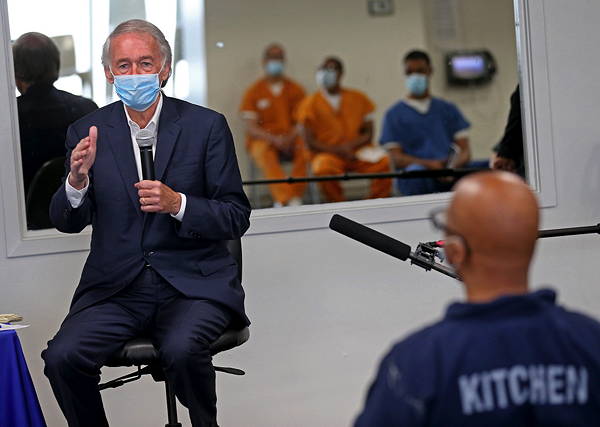
Both candidates have been outspoken about their support for comprehensive criminal justice reform, giving speeches inside prisons to reach impacted communities. Here, U.S. Sen. Edward Markey talks to inmates on July 7. (Photo: Matt Stone/Boston Herald)
DSW Newsletter #17 (August 2020)
Hero(es) of the Month: TS Candii, SX Noir, and Gizelle Marie Organize the Largest Sex Worker March in U.S. History

MA Democratic Senate Candidates Are Listening to Sex Workers

NY Senate Fails Trafficking Survivors, Again

DSW’s Kaytlin Bailey on Sex Work and Police Reform

DSW Takes Action Against EARN IT

The Stripper Strike Goes National

 Hero(es) of the Month: TS Candii,...
Hero(es) of the Month: TS Candii,...
 MA Democratic Senate Candidates Are Listening...
MA Democratic Senate Candidates Are Listening...
 NY Senate Fails Trafficking Survivors, Again
NY Senate Fails Trafficking Survivors, Again
 DSW’s Kaytlin Bailey on Sex Work...
DSW’s Kaytlin Bailey on Sex Work...
 DSW Takes Action Against EARN IT
DSW Takes Action Against EARN IT
 The Stripper Strike Goes National
The Stripper Strike Goes National
